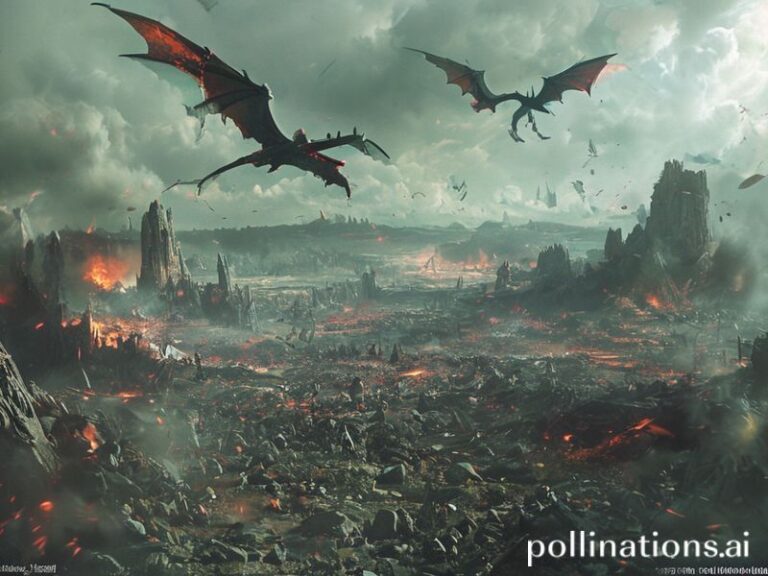Global Insurance Is Now a $6 Trillion Bet on Human Panic—And the House Always Wins
The planet is now so comprehensively insured that, should a meteor obliterate the Eastern Seaboard tomorrow, actuaries in Zurich would yawn, adjust their spreadsheets, and schedule a Zoom call before the dust cloud reached Europe. In 2024, insurance is less a safety net than the world’s largest, most neurotic casino—one where every house always wins, and the chips are denominated in human anxiety.
Start with the numbers, because numbers are less depressing than people. The global insurance market is worth roughly six trillion dollars, a figure roughly equal to the GDP of every African nation combined plus the annual cocaine habit of Wall Street. Two-thirds sits in the United States and Europe, where citizens insure everything from Labradoodles to Labradoodle-themed NFTs. Meanwhile, one-third of the planet remains “under-insured,” which is insurance-speak for “too poor to pre-pay for disasters we know are coming.” Climate change alone is expected to add a cool one trillion in claims by 2030, a figure that will look quaint when Bangladesh finally submerges and insurers discover that fine print about “acts of gods” still applies, especially when the gods have shareholder meetings.
The industry’s elegant trick is to sell you protection against the future it helped create. Insurers were among the earliest financiers of both oil exploration and the green-bond market; they cheerfully underwrite coastal mansions in Florida while simultaneously lobbying for stricter zoning laws. The cognitive dissonance is so profitable it’s practically a dividend. In London, Lloyd’s of London still operates from a building shaped like a nuclear bunker, a coincidence no one finds funny anymore. Inside, brokers in pinstripe suits trade “parametric policies” that pay out automatically when a hurricane exceeds Category 3—essentially turning the Saffir-Simpson scale into a slot machine for re-insurers in Bermuda.
But the real action has moved to the Global South, where micro-insurance schemes are marketed with the missionary zeal of a 19th-century Bible salesman. Kenyan farmers can now insure a single bag of seed against drought for the price of a beer, which would be heart-warming if the same beer weren’t contributing to the drought via global supply chains. In India, women’s self-help groups bundle life insurance with cookstove purchases, creating a cheerful feedback loop: buy stove, live longer, pay premiums longer, die eventually—ideally after clearing the loan. The World Bank calls this “financial inclusion”; cynics call it “death as a service.”
China, never one to miss a growth market, has weaponized insurance as soft power. The Belt and Road Initiative now ships container-loads of policies along with concrete: ports in Sri Lanka, railways in Ethiopia, and, for good measure, political-risk coverage for whichever junta currently runs the host country. When the port defaults, Beijing collects the payout from Western re-insurers, effectively transferring wealth from German pensioners to Chinese state banks. It’s globalization’s most elegant mugging.
Back in the developed world, the game has become psychological. Cyber-insurance premiums are rising faster than ransomware attacks, which is saying something. Corporations that spent decades externalizing risk onto the climate are now externalizing cyber-risk onto insurers, who respond by insisting on “security audits.” These audits are performed by the same consultancies who previously assured everyone that Yahoo’s password storage was “industry-leading.” The circle of life, Simba, but with more PowerPoint.
And then there is the newest frontier: parametric pandemic cover. After COVID-19 wiped out two centuries of actuarial assumptions, insurers began selling policies that trigger when WHO declares a new global health emergency. The catch? Payouts are capped at a fraction of actual losses, ensuring that while the virus may kill you, your broker will merely maim your balance sheet. Policyholders receive a cheerful email: “Congratulations, you’ve survived to underwrite another day.”
Ultimately, global insurance is humanity’s most honest confession: we know exactly how screwed we are, and we’d like to pay in advance. It’s a futures market built on dread, a secular indulgence for a species that no longer believes in forgiveness but still buys extended warranties. The premiums keep rising, the exclusions keep multiplying, and still we sign, because the alternative—facing uncertainty naked—is too horrifying to contemplate. Somewhere, an actuary smiles, adjusts the mortality tables for heat-stroke, and books another vacation in Iceland. After all, that island is forecast to stay above sea level until at least 2060, and by then the policy will have matured.







